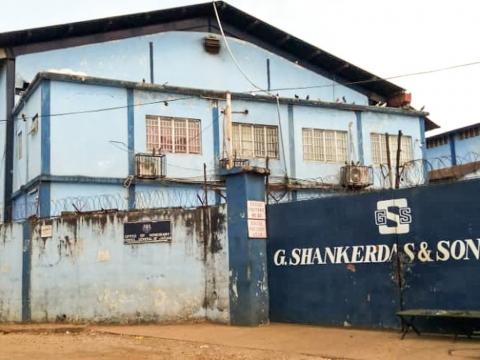By Mohamed Jaward Nyallay and Francis H. Murray
Residents of Kissy Dockyard are on edge after the manufacturing company, G. Shankerdas and Sons Limited was hit by what is suspected to be a wave of Covid-19 cases.
At least two people are said to have fallen ill, one of whom is reported to have dead. As a consequence, the company has been forced to halt its operations and its entire premise has been quarantined.
Efforts to get officials of either the company or the Covid-19 Response Team to confirm the exact situation proved futile.
Community people who spoke to Politico said the two confirmed cases were foreign nationals working with the company.
Sources said the deceased was the sister of the company’s manager, Kishore Shankerdas.
The Indian-owned company manufactures plastic and produces liquor and packaged water.
In the wake of the outbreak, a community organization accused the company of endangering lives in the community by ignoring safety protocols in their facility much against the advice of the ministry of health.
Tejan Kamara, Secretary General of the Kissy Dockyard Community Association, said they wrote a letter on the 28th April expressing concerns about the lack of safety protocols at the company’s plant. That letter, which he said was addressed to the Environment Protection Agency, also contained complaints about the relationship between the company and the community.
“It is with great concern we forward our report that the said company is not observing the public health measures being put in place by government, i.e hand washing, social distancing and mask wearing” a portion of a copy of the letter seen by Politico reads.
Kamara said a meeting was subsequently held with EPA officials on Thursday, May 14 but that at that time Shankerdas had already recorded the first case of the viral disease and so they couldn’t attend the meeting.
“This has caused a lot of tension in the community, because many people work in the company and so an outbreak in the facility is very alarming,” Kamara told Politico.
Officials of the company contacted by Politico all declined to comment on the allegations by the community.
Bintu Kamara, a resident of the community who sells food just outside the gates of the company, is one of many residents who say they are worried about the possible consequence the situation holds for them.
“We wonder where that case would have come from. A company as big as Shankerdas should have prioritized preventive measures to prevent this situation,” she said.
“And this used to be our point of sale. When it’s lunch time, the company workers buy our food, which has been very helpful. But now we are all discouraged, not knowing what to even do,’’ she lamented.
Another concern of the community people is that because of the failure of the health authorities to respond to the situation appropriately, it’s unclear to them how many people could have come into contact with the confirmed cases.
The EOC spokesman did not respond to Politico’s request for details on how many more cases have been recorded in the area or in the company’s facility.
We could not confirm either how many people were in quarantine in the facility.
A source told Politico that there had been concern over lack of support from the EOC, especially in terms of food for those in quarantine. They said the company’s management has been helping with what little food they receive.
A military officer stationed just out of the company’s gate confirmed this, saying the people have relied on the manager of the company who was providing food for those in quarantine.
“Nothing is going on currently,” he said, referring to the halt in operations.
“The Manager has been coming in to help in the area of food by giving money to a woman in the neighborhood to prepare food and then bring it for the people inside the compound. Every other thing remains normal and health workers and contract tracers are visiting daily,” the officer said.
The closure of the company also comes with huge economic impact on the local economy and the livelihood of hundreds of youths. The company is a leading producer of alcoholic drinks in the country.
A senior official who didn’t want to be named told Politico that the closure means the company is losing Le 100 million daily.
Ibrahim Jalloh, a casual worker with the company, is worried about the implication of the situation on him, financially. Jalloh is paid a daily wage. The closure means he is out of job for at least two weeks.
“Life is really not easy for us now. I used to save the little I’m paid on a daily basis to help my family, but now, it’s not forthcoming. Coronavirus has snatched away the limited jobs we had and this has resulted in serious suffering because no work, no pay,’’ he said.
As at today Monday 18th May, Sierra Leone has recorded 519 cases of COVID-19.
Copyright © 2020 Politico Online








